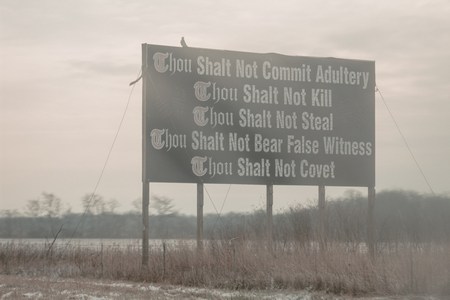Should We Still Follow The Old Law Of Moses?
 A large problem that exists in the religious world is what we should do about the Old Testament. There are some who believe that it’s correct to still use the Old Testament as our modern day standard bearer. Then there are some who believe that the Old Testament is no longer valid today, and that it should no longer be followed. What is the proper answer? Let us obtain the answer, not from the opinions of men, but rather from the inspired Scriptures.
A large problem that exists in the religious world is what we should do about the Old Testament. There are some who believe that it’s correct to still use the Old Testament as our modern day standard bearer. Then there are some who believe that the Old Testament is no longer valid today, and that it should no longer be followed. What is the proper answer? Let us obtain the answer, not from the opinions of men, but rather from the inspired Scriptures.
In the epistle that we call Galatians, the apostle Paul addressed this subject wonderfully. At the time of his writing, there were certain teachers who were encouraging new Christians to keep the Old Law. In response to this teaching, Paul asked, “O foolish Galatians, who hath bewitched you, that ye should not obey the truth, before whose eyes Jesus Christ hath been evidently set forth, crucified among you” (Gal. 3:1)? The decision to obey no longer the truth is because they had been persuaded to keep the Law of Moses. Paul then asked them another question. “This only would I learn of you, Received ye the Spirit by the works of the law, or by the hearing of faith” (Gal. 3:2)? In this question, Paul gave two options: “the works of the law” (Old Law of Moses) or “the hearing of faith” (Gospel of Christ). Undoubtedly the Galatians would have had to acknowledge that they had not “received the Spirit” under the Old Law, but rather under the New Law. To further make his point, Paul then asked another question. “He therefore that ministereth to you the Spirit, and worketh miracles among you, doeth he it by the works of the law, or by the hearing of faith” (Gal. 3:5)? Again, the Galatians would have no suitable choice than to acknowledge that the “ministering of the Spirit” and the working of miracles, were done “by the hearing of faith” (Gospel of Christ) and not “by the works of the law” (Old Law of Moses).
It was then that Paul brought forth an example that proved that the Old Law of Moses was never intended to be permanent. The apostle’s example predated the giving of the Old Law of Moses. His example was the promise that God had made to Abraham so many years prior. The promise was that through Abraham’s seed all nations of the earth would be blessed (Gen. 12:1-3). Please notice that the promise was that “all nations” would be blessed through Abraham’s seed, not just the nation of Israel. Paul explained, “And the scripture, foreseeing that God would justify the heathen through faith, preached before the gospel unto Abraham, saying, In thee shall all nations be blessed” (Gal. 3:8). He then further made his point against the Old Law of Moses by stating, “For as many as are of the works of the law are under the curse: for it is written, Cursed is every one that continueth not in all things which are written in the book of the law to do them. But that no man is justified by the law in the sight of God, it is evident: for, The just shall live by faith” (Gal. 3:10-11; cf. Hab. 2:4). Paul then affirmed that “Christ hath redeemed us from the curse of the law, being made a curse for us: for it is written, Cursed is every one that hangeth on a tree: That the blessing of Abraham might come on the Gentiles through Jesus Christ; that we might receive the promise of the Spirit through faith” (Gal. 3:13-14).
With his explanation being sound, Paul then took the opportunity to let the Galatians know just why, and for how long, the Old Law of Moses was to be in effect. “Wherefore then serveth the law? It was added because of transgressions, till the seed should come to whom the promise was made; and it was ordained by angels in the hand of a mediator” (Gal. 3:19). The Law of Moses was inserted because of sin. It was to remain in effect until an appointed time that “the seed should come”. This was a reference to Christ. “Wherefore the law was our schoolmaster to bring us unto Christ, that we might be justified by faith” (Gal. 3:24). The Old Law of Moses has served its purpose. The Gospel of Jesus Christ is now here, and as Paul put it, “But after that faith is come, we are no longer under a schoolmaster” (Gal. 3:25).
If someone tries to convince you to observe any part of the Old Law of Moses, then you should refuse to be swayed by such attempts (cf. Rom. 15:4). We live under the Gospel of Jesus Christ, the New Law or Testament (cf. Heb. 9-10). When we obey the Gospel, we become the children of Abraham, “and heirs according to the promise” (Gal. 3:29).
~ Corey Barnette

